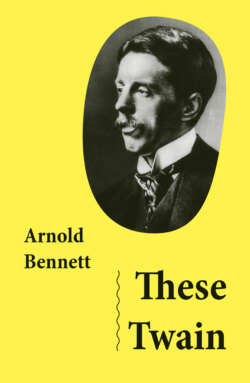Читать книгу These Twain (Unabridged) - Arnold Bennett - Страница 18
На сайте Литреса книга снята с продажи.
ii
ОглавлениеThen came the proof of the genius, the cynicism and the insight of the leviathan newspaper-proprietor who had invented the dodge of inviting his readers to risk a shilling and also to buy a coupon for the privilege of supplying a missing word, upon the understanding that the shillings of those who supplied the wrong word should be taken for ever away from them and given to those who supplied the right word. The entire company in the Clayhanger drawing-room was absorbed in the tremendous missing-word topic, and listened to Swetnam as to a new prophet bearing the secret of eternal felicity. The rumour of Swetnam’s triumph drew people out of the delectable dining-room to listen to his remarks; and among these was Auntie Hamps. So it was in a thousand, in ten thousand, in hundreds of thousands of homes of all kinds throughout the kingdom. The leviathan journalist’s readers (though as a rule they read nothing in his paper save the truncated paragraph and the rules of the competition) had grown to be equivalent to the whole British public. And he not only held them but he had overshadowed all other interests in their minds. Upon honeymoons people thought of the missing-word amid caresses, and it is a fact that people had died with the missing word on their lips. Sane adults of both sexes read the dictionary through from end to end every week with an astounding conscientiousness. The leviathan newspaper-proprietor could not buy enough paper, nor hire sufficient presses, to meet the national demands. And no wonder, seeing that any small news-agent in a side street was liable at any moment to receive an order from an impassioned student of periodical literature for more copies of one issue of the journal than the whole town had been used to buy before the marvellous invention of the missing-word. The post office was incommoded; even the Postmaster General was incommoded, and only by heroical efforts and miraculous feats of resourcefulness did he save himself from the ignominy of running out of shilling postal orders. Post office girls sold shilling postal orders with a sarcastic smile, with acerbity, with reluctance,—it was naught to them that the revenue was benefited and the pressure on taxpayers eased. Employers throughout the islands suffered vast losses owing to the fact that for months their offices and factories were inhabited not by clerks and other employees, but by wage-paid monomaniacs who did naught but read dictionaries and cut out and fill up coupons. And over all the land there hung the dark incredible menace of an unjust prosecution under the Gambling Laws, urged by interfering busybodies who would not let a nation alone.
“And how much did you make last week, Mr. Swetnam?” judicially asked Albert Benbow, who was rather pleased and flattered, as an active Wesleyan, to rub shoulders with frank men of the world like Tom. As an active Wesleyan he had hitherto utterly refused to listen to the missing-word; but now it seemed to be acquiring respectability enough for his ears.
Swetnam replied with a casual air:
“We didn’t make much last week. We won something, of course. We win every week; that’s a mathematical certainty—but sometimes the expenses mount up a bit higher than the receipts. It depends on the word. If it’s an ordinary word that everybody chooses, naturally the share is a small one because there are so many winners.” He gave no more exact details.
Clara breathed a disillusioned “Oh!” implying that she had known there must be some flaw in the scheme—and her husband had at once put his finger on it.
But her husband, with incipient enthusiasm for the word, said: “Well, it stands to reason they must take one week with another, and average it out.”
“Now, Albert! Now, Albert!” Edwin warned him. “No gambling.”
Albert replied with some warmth: “I don’t see that there’s any gambling in it. Appears to me that it’s chiefly skill and thoroughness that does the trick.”
“Gambling!” murmured Tom Swetnam shortly. “Of course it’s not gambling.”
“No!”
“Well,” said Vera Cheswardine, “I say ‘novelty.’ ‘A double event of unique novelty.’ That’s it.”
“I shouldn’t go nap on ‘novelty,’ if I were you,” said Tom Swetnam, the expert.
Tom read the thing again.
“Novelty,” Vera repeated. “I know it’s novelty. I’m always right, aren’t I, Stephen?” She looked round. “Ask Stephen.”
“You were right last week but one, my child,” said Stephen.
“And did you make anything?” Clara demanded eagerly.
“Only fifteen shillings,” said Vera discontentedly. “But if Stephen had listened to me we should have made lots.”
Albert Benbow’s interest in the word was strengthened.
Fearns, leaning carefully back in his chair, asked with fine indifference: “By the way, what is this week’s word, Tom? I haven’t your secret sources of information. I have to wait for the paper.”
“‘Unaccountably,’” said Tom. “Had you anything on it?”
“No,” Fearns admitted. “I’ve caught a cold this week, it seems.”
Albert Benbow stared at him. Here was another competitor—and as acute a man of business as you would find in the Five Towns!
“Me, too!” said Edwin, smiling like a culprit.
Hilda sprang up gleefully, and pointed at him a finger of delicious censure.
“Oh! You wicked sinner! You never told me you’d gone in! You deceitful old thing!”
“Well, it was a man at the shop who would have me try,” Edwin boyishly excused himself.
